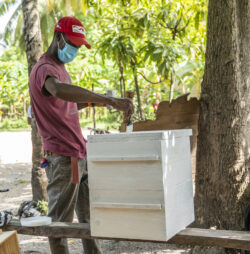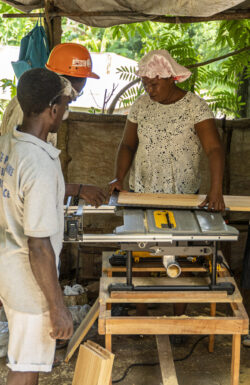Caribbean
Building Resilience in Haiti: Training in Modern Beehive Construction
Words by Jéthro-Claudel Pierre Jeanty, below in French
The foundations are being laid in Haiti, particularly in the communes of Petit-Trou de Nippes and Les Baradères, in the Nippes department, to strengthen the resilience of the population from months of political and social unrest. Training courses are aimed at transforming people who may not know about sustainable practices into genuine agents of environmental protection. At present, some twenty craftspeople are receiving training in a project focused on climate protection and adaptation.
Facilitated by MI Americas, along with the Haitian American Association of Agricultural, Medical, and Engineering Services (AHAAMES), this project involves the restoration of mangrove ecosystems in Haiti, with efforts connected to a similar initiative in northern Colombia. The training aims to equip these craftspeople with skills and knowledge to help restore and manage mangrove forests, which play a crucial role in protecting coastal areas and mitigating the impacts of climate change.
 Participants learn to handle all the tools needed to build modern beehives, including table saws and planers. These tools, mostly electric, enable them to work quickly and precisely. They also learned all the steps involved in producing hives that meet international standards, i.e. the measuring system for working with precision, the type of wood to use and how to assemble the hives, among other things.
Participants learn to handle all the tools needed to build modern beehives, including table saws and planers. These tools, mostly electric, enable them to work quickly and precisely. They also learned all the steps involved in producing hives that meet international standards, i.e. the measuring system for working with precision, the type of wood to use and how to assemble the hives, among other things.
This type of hive is designed to prevent bees from developing certain behaviors that are detrimental to honey production. This training program, which is new to the area, is being delivered to a public with a varied profile, including cabinetmakers, charcoal makers, charcoal merchants and traditional beekeepers, among others.
Antonine Charles, a beekeeper and fish merchant, made no secret of her satisfaction at having taken part in this training course, which enabled her to “grow economically and socially”, in her own words.
“Without the help of Malteser International Americas, this training would not be possible. Because we don’t have enough money to buy the equipment and materials needed to carry it out”, she stressed.
The training courses were prompted by the findings of MI Americas and AHAAMES, as well as requests from the field to provide beekeepers in the area with modern hives. Before this project, they had to travel to far-away communes to buy their hives. Now, they’ll be able to build better-quality hives on the spot. With this initiative, sustainable economic alternatives are being created for communities living on the edge of mangrove forests in the Nippes department.
Following this series of training courses, each commune will benefit from a batch of modern materials to enable craftsmen to manufacture the hives needed by local beekeepers at affordable prices.
Consider a donation to craftspeople in Haiti on their journey to sustainable livelihoods!
Renforcer la résilience en Haïti : Formation à la construction de ruches modernes
Les bases sont en train d’être posées en Haïti, notamment dans les communes de Petit-Trou de Nippes et des Baradères, dans le département des Nippes, pour renforcer la résilience de la population après des mois de troubles politiques et sociaux. Actuellement, une vingtaine d’artisans incluant des femmes reçoivent une formation sur la fabrication de ruches modernes dans le cadre d’un projet axé sur la protection et l’adaptation au climat. Ces formations visent à transformer les personnes qui ne connaissent pas les pratiques durables en véritables agents de protection de l’environnement.
Facilité par MI Americas et l’Association haïtiano-américaine des services agricoles, médicaux et d’ingénierie (AHAAMES), ce projet implique la restauration des écosystèmes de mangrove en Haïti, avec des efforts liés à une initiative similaire dans le nord de la Colombie. La formation vise à doter ces artisans des compétences et des connaissances nécessaires pour contribuer à la restauration et à la gestion des forêts de mangroves, qui jouent un rôle crucial dans la protection des zones côtières et l’atténuation des effets du changement climatique.
Les participants apprennent à manier tous les outils nécessaires à la fabrication de ruches modernes, dont scie de table et raboteuse. Ces outils, majoritairement électriques, leur permettent de travailler vite et avec précision.
Ils ont aussi appris toutes les étapes nécessaires à la production de ruches respectant les normes internationales, c’est-à-dire le système de mesure pour travailler avec précision, le type de bois à utiliser et le montage des ruches, entre autres.
Ce type de ruche est conçu de manière à empêcher les abeilles de développer certains comportements néfastes à la production du miel. Cette formation qui est nouvelle dans la zone est dispensée au profit d’un public avec un profil varié, dont des ébénistes, des charbonniers, des marchands de charbon et des apiculteurs traditionnels, entre autres.
Antonine Charles qui est apicultrice et marchande de poisson n’a pas caché sa satisfaction pour avoir participé à cette formation qui lui permettra de « grandir économiquement et socialement », selon ses propres mots.
« Sans l’aide de Malteser International, cette formation ne serait pas possible. Car, nous n’avons pas assez d’argent pour acheter les équipements et les matériaux nécessaires à la réalisation », a-t-elle souligné.
Ces formations font suite aux constats de MI et de AHAAMES ainsi que des demandes venues sur le terrain faisant état des difficultés des apiculteurs et apicultrices de la zone pour se procurer de ruches modernes. Avant, ils devaient se rendre dans des communes très éloignées pour pouvoir acheter leurs ruches. Maintenant, ils vont pouvoir en construire avec une meilleure qualité sur place.
Avec cette initiative, des alternatives économiques durables sont créées au profit des communautés vivant à la lisière des forêts de mangrove dans le département des Nippes.
A la suite de cette série de formations, chaque commune bénéficiera d’un lot de matériels modernes pour permettre aux artisans de fabriquer à un prix abordable les ruches dont les apiculteurs de la zone auront besoin.
Envisagez de faire un don pour aider les artisans en Haïti et continuer à rendre possible des moyens de subsistance durables !